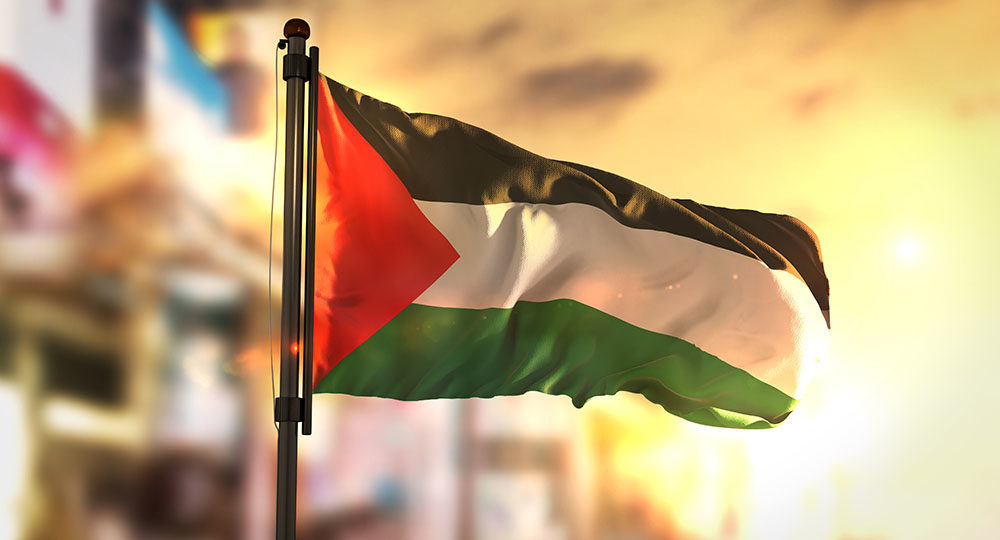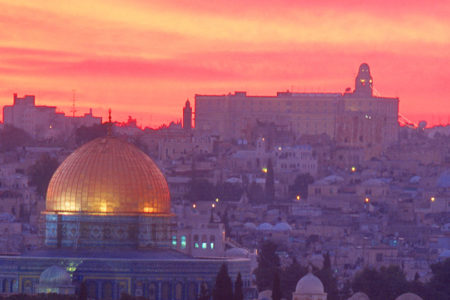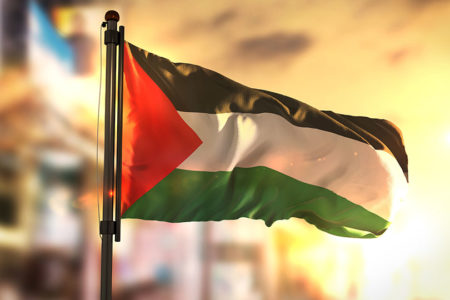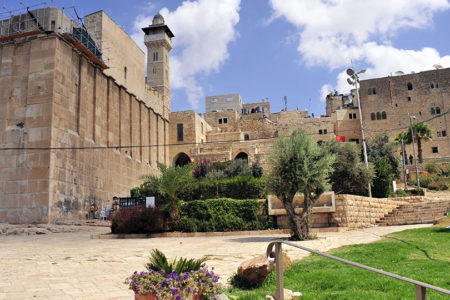The Palestinians
“And Isaac entreated the Lᴏʀᴅ for his wife, because she was barren: and the Lᴏʀᴅ was entreated by him, and Rebekah, his wife, conceived. And the children struggled together within her; and she said, If it be so, why am I thus? And she went to inquire of the Lᴏʀᴅ. And the Lᴏʀᴅ said unto her, Two nations are in thy womb, and two manner of people shall be born of thee; and the one people shall be stronger than the other people; and the elder shall serve the younger” (Gen. 25:21–23).
This biblical account of an ancient struggle between two unborn sons, Jacob and Esau, is being played out again in the same land but in a different age. Just as two nations struggled then within the womb of Rebekah, two nations are struggling today within the womb of the Holy Land. Israelis and Palestinians, one a political nation and the other an ethnic nation, are presently grappling with one another for life and death in the land of the Bible. An article written today about the outcome of the current peace process would be outdated within a few months or even weeks. Nevertheless, we can gain a better understanding of the conflict by looking at some of the background of the peoples involved.
While readers of this publication probably know something about the Israelis—their biblical history, scriptural promises, and current situation in the Middle East—many may wonder exactly who the Palestinians are and from whence they came. Stereotypes of terrorists in ski masks, while only too real in some instances, dominate our perception of the Palestinian identity. Who are these people? Why are they so opposed to Israel and desirous of their own state? This article will explore the historical background of these issues to provide answers to these crucial questions.
The word Palestine appears only once in the King James Version of the Bible, Joel 3:4. It appears three times in the form Palestina (Ex. 15:14; Isa. 14:29, 31). Each time, however, the Hebrew is the word for Philistia, and subsequent versions all render the word in that more precise translation. The Philistines, an ancient pagan people who inhabited the southwestern coast of Canaan, were some of Israel’s fiercest opponents. Their exploits are recounted in the books of Judges and 1 and 2 Samuel. The conflicts of Samson and many of David’s military struggles were with the Philistines. After their defeat by Hezekiah (2 Ki. 18:8), they do not reappear in the biblical account. Eventually they disappeared from history as a separate people, through either assimilation or conversion. It is highly unlikely, however, that they were the ancestors of the present Palestinian people. This author knows of no Palestinian writer who makes that claim, although some have declared that the Palestinians are descendants of the Canaanites, another pagan group who were widespread over the land of Canaan in biblical times.
The fact is that there has never been a country called Palestine, and the use of the word Palestine as an ethnic distinction did not begin until the 20th century. The word actually comes from the Latin word Palestina, the name given to the region by the Roman Emperor Hadrian in 135 A.D. following his suppression of a Jewish rebellion led by the false messiah, Bar Cochba. Formerly the province had been called Judea, which related to its Jewish character and referred back to the biblical tribe of Judah. Hadrian wanted to humiliate and punish the Jews by eliminating any Jewish association with the land. He therefore used the Latin name Palestina for the ancient non-Jewish inhabitants of the coast—the people of Philistia. Only since the second century A.D. has the name Palestine been used for the region, and in a decidedly pagan context, to say the least.
Palestine was never an independent country; it was always a province of the larger district known as Syria. This was true throughout the Turkish control of the area, which ended with World War I, when two European powers divided up the Turkish domains in the eastern Mediterranean. France was given a mandate over the northern parts consisting of Syria and Lebanon, and Britain was given a mandate over the southern portion, the area from the Lebanon mountains south to the Sinai peninsula on both sides of the Jordan River, which was called Mandate Palestine.
The ironic aspect of this arrangement was that all people living in Palestine were referred to as Palestinians—Jews as well as Arabs. From 1920 to 1948, Jewish people living there were Jewish Palestinians, and Arabs living there were Arab Palestinians.
There was no real independent movement for Palestinian nationhood during the British Mandate period. That desire was not discussed seriously by the Arabs until the 1970s, a fact hardly recognized in the current debate over Palestinian statehood. Consider the following:
In 1947 the United Nations voted to partition the mandated area of Palestine into two separate countries—one a Jewish-dominated state and the other an Arab-dominated state. They divided the part west of the Jordan River into two irregular sections. (The eastern part had already been given to the Bedouin King Abdullah in 1922 and had become the country called Transjordan.) Although such a decision was not exactly what the Zionist leadership under David Ben Gurion wanted, they accepted the U.N. decision and began to prepare for Jewish statehood. The Arabs, however, both inside and outside of Palestine, unilaterally rejected the plan, although it called for an independent Arab nation in Palestine. History is filled with ironies and might-have-beens, one of the strangest of all being the fact that the Palestinian Arabs had an opportunity to have their own Palestinian state in 1948, but they rejected it outright for two reasons: (1) The Arabs, particularly the Muslims, rejected any plan permitting a Jewish state in the Middle East. Such an act was, and still is, considered an insult to Islam. (2) There was no strong movement for an independent Palestinian state at that time, a fact noted earlier. The surrounding Arab countries did not want an independent Palestine, and the Palestinian leadership at the time did not press for it. Most Palestinian Arabs saw themselves as part of the larger Arab people, identifying with either Jordan or Syria.
Another overlooked irony is the theory that Palestinian nationalism owes its creation to the Jews and Zionism. In an excellent book entitled The Palestinians by Kimmerling and Migdal, two Israelis very sympathetic to the Palestinian cause, this point is effectively made.
In some ways, the Jewish national movement has shaped the Palestinian people almost as much as it did the Jews themselves. Had it not been for the pressures exerted on the Arabs of Palestine by the Zionist movement, the very concept of a Palestinian people would not have developed; and Palestinians quite accurately understand their society’s essential, existential status as the direct result of Jewish political rejuvenation and settlement.
This argument states that the Arabs in Palestine eventually responded to the Zionist movement toward statehood with a national movement of their own. Thus, the Palestinian movement would not have developed without the Jews.
There is another historical development that must be considered in any discussion of the Palestinians—the sad story of the Palestinian refugees. As a result of the declaration of Jewish statehood in 1948, approximately 700,000 Palestinian Arabs became homeless. Those refugees have been cared for by the United Nations, with no significant help from the oil-rich Arab countries. Only Jordan offered them citizenship, all the while keeping the vast majority of refugees in squalid camps, which became breeding grounds for hatred toward Israel and training camps for terrorism. The Arabs have unanimously blamed the creation of the refugee problem on Israeli soldiers, who forced them to leave. Israelis, on the other hand, have placed the blame on the Arab leaders, who told the Palestinian Arabs to leave their homes until the Arab armies destroyed the Israelis—which they never did. A fair reading of all the sources reveals a more complex picture. Even before the war officially began in May 1948, thousands of Arabs had left their homes in fear and in obedience to the call from the Arab leadership. When the battles officially commenced, many simply fled because they were caught in the middle of heavy fighting. Finally, there were some cases of Israeli soldiers forcing residents to leave their homes, especially in Lydda and Ramle.
The sad truth about war is that it almost always results in refugees and population transfers. An often overlooked fact is that there were more than a half million Jewish refugees from Arab lands as a result of the 1948 war, many of whom were forced to abandon their possessions as they left such Arab countries as Egypt, Algeria, Iraq, and Yemen. Israel absorbed these homeless Jews, despite the great difficulty, rather than place them in refugee camps. That enormous task was undertaken with few resources, the young state already having been taxed to its limit after absorbing the multitudes left homeless by the Nazi Holocaust.
The plight of the Palestinian refugees is certainly tragic, but the entire blame cannot be placed on Israel. The sad reality is that the refugees have been exploited as political pawns by the Arab countries and, as thorns in Israel’s side, are always pointed to as an example of the evils of Zionism. Unfortunately, the Palestinian leadership has in recent years been more concerned with the promotion of terrorist attacks on civilians than with meaningful efforts toward peace. Abba Eban once said, “The Palestinians never miss an opportunity to miss an opportunity.” They missed an opportunity in 1948 when they rejected a chance to have their own country. Until recently, they have missed every opportunity that proposed anything less than the destruction of Israel. They appear to have focused more on promoting terrorism than peace.
I personally know many Palestinians, and I have found that, despite the error of their leadership, most individual Palestinians are more reasonable about the reality of living with the Israelis. The Arabs who chose not to flee in 1948 have prospered as Israeli citizens and have one of the higher standards of living in the Middle East. Many individual Palestinians long for peace but have been silent due to PLO intimidation.
Many Israelis are hesitant about an independent Palestinian state, and we must appreciate their concern. It is difficult to erase the memories of Yasser Arafat embracing Saddam Hussein or Palestinians cheering the Iraqi Scuds as they fell on Tel Aviv and Haifa during the Gulf War. It is impossible to erase the memories of thousands of Israeli civilians slaughtered by Palestinian terrorist attacks. If Arafat means what he says about peace, then let there be a unified abandonment of terrorism. As long as Hamas and other Islamic fundamentalist groups have their way, it is difficult to see peace developing without the Prince of Peace in control.
As Bible-believing Christians, we must recognize the biblical fact that the land of Israel was promised to the descendants of Jacob. This should not blind us, however, to the immediate human needs of the Palestinians—tragic figures victimized mostly by their own people, but also by a history they feel has wronged them deeply. Let us not add to that pain by unfair stereotyping and cruel comments. Did not Christ die for Ishmael as well as for Isaac?
Often I am asked how many gospel-preaching assemblies and churches are in Israel. As far as we can ascertain, there are at least three dozen Messianic congregations there, composed mainly of Jewish believers. We at The Friends of Israel are thankful to be involved closely with one of those assemblies, whose spiritual leader is also an Institute of Biblical Studies graduate. But there are also dozens of other churches in Israel composed of Palestinian Arab believers. In some of those assemblies, born-again Arabs worship alongside born-again Jews. Those brethren are experiencing the inner reality that Yitzhak Rabin and Yasser Arafat are outwardly trying to discover.
The root problem of both the terrorists and their intended victims is the same. Let us not deny either the opportunity to know the one who can give them both lasting peace in this world and eternal life in the next.









Thank you for the education ! This really helped me with questions I had this evening !
The Palestinians are modern day Amalekites – Coming from the generations of Esau and the Edomites. It’s all right there in the Bible you can track his lineage from Haman, to Herod the Great and even Yasser Arafat. The conflict between Israel and Palestine is prophecy playing out as God said that these two nations, these two brothers, would be hostile towards each other from generation to generation.